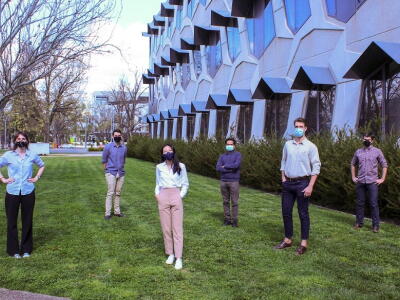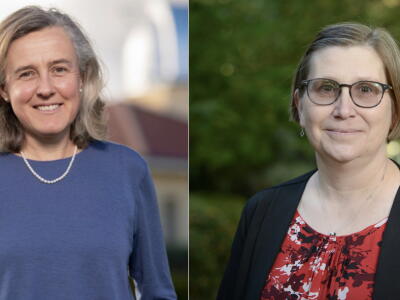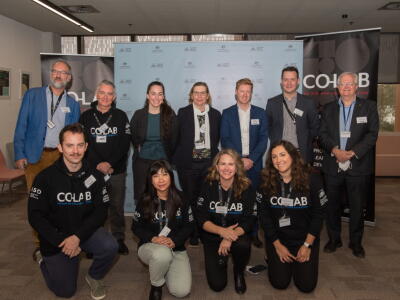ANU researchers celebrated by Australian Academy of Science
Posted on
Seven researchers from The Australian National University (ANU) were celebrated and formally admitted to the Australian Academy of Science (AAS) at the Academy’s flagship, four-day event, Science at the Shine Dome 2024.
Professor Kylie Catchpole, Professor Nerilie Abram, Professor Andrew Blakers, Professor Hrvoje Tkalčić, Professor Mark Krumholz, Professor Shahar Mendelson and Professor Louis Moresi are the newest Academy Fellows elected by their peers in 2023 and 2024.
The event on September 9-12 honoured outstanding achievements in science in front of Australia’s science community, including Academy Fellows, researchers, government, politicians, media, science-associated organisations and the science-interested public.
As well as all Fellows elected in 2023 and 2024, award recipients from 2023 and 2024 were also recognised at the event.
Professor David Lindenmayer (ANU Fenner School of Environment & Society) received the 2024 Macfarlane Burnet Medal and delivered the accompanying lecture.
Other ANU experts honoured included plant ecophysiologist Dr Mirindi Eric Dusenge and evolutionary biologist Dr Emily Roycroft, from the ANU Research School of Biology, who received the JG Russell Award which supports early career researchers in science.
Find out more about criteria for election to the Academy and how to nominate a scientist for Fellowship.
The ANU experts acknowledged at Science at the Shine Dome 2024:
Professor Kylie Catchpole
Professor Catchpole’s pioneering work on the mechanisms of nanoscale interaction between light and semiconductors established new approaches to improve light absorption in solar cells. She led the development of perovskite solar cells and tandem solar cells with world record efficiencies, through building a deep understanding of how ions, electrons and device structure combine to affect solar cell performance. Professor Catchpole’s work focuses on next generation technologies that will accelerate the efficiency and development of solar energy. See Professor Catchpole's speech here.
Professor Nerilie Abram
Professor Abram’s multidisciplinary approach to understanding the behaviour of Earth’s climate system has changed the way we think about human-induced climate change. She is working with natural recorders of the Earth’s climate, including Antarctic ice layers and tropical coral skeletons, to build a more complete understanding of our climate. See Professor Abram's speech here.
Professor Andrew Blakers
Professor Blakers’ valuable contributions to solar energy and helping the global economy decarbonise have been recognised. Professor Blakers has made major contributions to the advancement of solar energy as the key to decarbonising the global economy. He’s globally prominent in analysis of 100 per cent renewable energy systems and developed the Global Atlas of Pumped Hydro Energy Storage. He is co-winner of numerous awards including the 2023 Queen Elizabeth Prize for Engineering and the 2018 Eureka Prize for Environmental Research. See Professor Blakers' speech here.
Professor Hrvoje Tkalčić
Professor Tkalčić has helped us better understand the Earth’s interior, especially the inner core. His research also uses global seismology and mathematic geophysics tools to improve our knowledge of the internal structure of other planets, too. See Professor Tkalčić's speech here.
Professor Mark Krumholz
Astrophysicist Professor Krumholz is a world leader in the study of star formation and the interstellar medium. He has contributed to our understanding of the mechanisms that control the rates at which galaxies form stars, and the way stars cluster in space and time. These advances have been enabled by new techniques that Krumholz pioneered in computational astrophysics. His standing in the field has been recognised by numerous international awards and his textbook on star formation has shaped the next generation of researchers in the field. See Professor Krumholz's speech here.
Professor Shahar Mendelson
Professor Mendelson’s work has led to ground-breaking progress in the field of theoretical data science. He has used his discoveries to solve fundamental questions in machine learning, signal processing and statistics. The machinery he developed has also resulted in the solution of several significant open problems in pure mathematics, mainly in asymptotic geometric analysis and the asymptotic theory of random matrices.
Professor Louis Moresi
Elected in 2023, Professor Moresi has made major advances in the discipline of geodynamics helping to expand the use of computational physics into mainstream geology and tectonics. He is a champion of open-source scientific software and the originator of several community codes that have made quantitative modelling accessible across multiple disciplines in the Earth sciences. See Professor Moresi's speech here.
The following ANU scientists also received their awards:
- Professor Si Ming Man – Gottschalk Medal 2023
- Professor Richard Hartley – Hannan Medal 2023
- Professor Susan Scott – Thomas Ranken Lyle Medal 2023
- Professor Yuerui Lu – Pawsey Medal 2023
- Associate Professor Ana Martins Sequeira – Fenner Medal 2024
You may also like
Plastic chomping company takes out top sustainability award
An ANU-backed start up that is turning the tide on the wave of plastic pollution flooding our planet has taken out a top prize in one of Australia's major sustainability awards.
Galactic gains and mighty grains earn ANU stars top accolade
A leading astrophysicist uncovering the deep inner secrets of the Milky Way and a renowned plant scientist tackling one of the greatest challenges facing the agriculture industry have both been newly…
Co-Lab celebrates its Honours Grant recipients
One of the keystone partnerships at ANU, the Co-Lab, has welcomed and celebrated its inaugural cohort of 2022 Co-Lab Honours Grant recipients.


